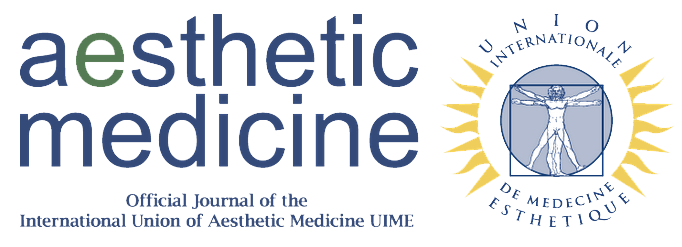Prepectoral Versus Subpectoral Implant-based Breast Reconstruction: Evaluation of the Aesthetic Outcomes by Plastic Surgeons and General Practitioners.
Prepectoral vs subpectoral breast reconstruction: aesthetic outcomes assessment.
Keywords:
Breast implants, DTI reconstruction, Skin Sparing mastectomy, Nipple sparing mastectomyy, Aesthetic assessment, QuestionnaireAbstract
Background: In breast reconstruction after skin or nipple sparing mastectomy, breast implants may be placed in subpectoral or prepectoral position. In the literature a comparative evaluation of aesthetic outcomes after these two techniques is lacking.
Aim: This study aims to evaluate the aesthetic outcomes of breast reconstruction after these reconstructive techniques by mean of a questionnaire.
Methods: This retrospective observational study concerns patients receiving breast reconstruction with prosthesis from 2018 to 2021, after skin or nipple sparing mastectomy. Inclusion criteria were the presence of a pre- and postoperative breast measurements, and preoperative and one year follow-up photographs. Aesthetic assessment was done by a panel of Plastic Surgeons and General Practitioners by mean of a questionnaire, inquiring the overall aesthetic aspect of breast area pre and postoperatively. General practitioners and surgeons’ judgements were statistically analyzed. Correlation between single items and overall aesthetic outcome was analyzed and inter-observer variability was assessed.
Results: Twenty-six breast reconstructions (14 prepectoral and 12 subpectoral) were considered. The mean ratings of plastic surgeons were higher than those of General Practitioners. No statistically significant differences were found between the postoperative ratings of the two techniques. Volume and shape were found to be most correlated with overall satisfaction. The degree of intraclass correlation was generally high, but it was higher for general practitioners.
Conclusions: Subpectoral and prepectoral techniques were superimposable regarding aesthetic outcomes. General Practitioners' ratings were lower on average, showing a difference in aesthetic evaluation criteria between the two categories.
References
Schlenker JD, Bueno RA, Ricketson G, Lynch JB. Loss of silicone implants after subcutaneous mastectomy and reconstruction. Plast Reconstr Surg. 1978;62(6):853-861. doi:10.1097/00006534-197812000-00004
Ter Louw RP, Nahabedian MY. Prepectoral Breast Reconstruction. Plast Reconstr Surg. 2017;140(5S Advances in Breast Reconstruction):51S-59S. doi:10.1097/PRS.0000000000003942
Sigalove S, Maxwell GP, Sigalove NM, et al. Prepectoral Implant-Based Breast Reconstruction: Rationale, Indications, and Preliminary Results. Plast Reconstr Surg. 2017;139(2):287-294. doi:10.1097/PRS.0000000000002950
Vardanian AJ, Clayton JL, Roostaeian J, et al. Comparison of implant-based immediate breast reconstruction with and without acellular dermal matrix. Plast Reconstr Surg. 2011;128(5):403e-410e. doi:10.1097/PRS.0b013e31822b6637
Lee JS, Park E, Lee JH, et al. A prospective comparison study of early functional outcomes after implant-based breast reconstruction: subpectoral versus prepectoral technique. Ann Palliat Med. 2021;10(3):2520-2529. doi:10.21037/apm-20-1550
Li L, Su Y, Xiu B, et al. Comparison of prepectoral and subpectoral breast reconstruction after mastectomies: A systematic review and meta analysis. Eur J Surg Oncol J Eur Soc Surg Oncol Br Assoc Surg Oncol. 2019;45(9):1542-1550. doi:10.1016/j.ejso.2019.05.015
Li Y, Xu G, Yu N, Huang J, Long X. Prepectoral Versus Subpectoral Implant-Based Breast Reconstruction: A Meta-analysis. Ann Plast Surg. 2020;85(4):437-447. doi:10.1097/SAP.0000000000002190
Mirhaidari SJ, Azouz V, Wagner DS. Prepectoral Versus Subpectoral Direct to Implant Immediate Breast Reconstruction. Ann Plast Surg. 2020;84(3):263-270. doi:10.1097/SAP.0000000000002059
Plachinski SJ, Boehm LM, Adamson KA, LoGiudice JA, Doren EL. Comparative Analysis of Prepectoral versus Subpectoral Implant-based Breast Reconstruction. Plast Reconstr Surg Glob Open. 2021;9(7):e3709. doi:10.1097/GOX.0000000000003709
Visser NJ, Damen THC, Timman R, Hofer SOP, Mureau MAM. Surgical results, aesthetic outcome, and patient satisfaction after microsurgical autologous breast reconstruction following failed implant reconstruction. Plast Reconstr Surg. 2010;126(1):26-36. doi:10.1097/PRS.0b013e3181da87a6
Dikmans REG, Nene LEH, Bouman MB, et al. The Aesthetic Items Scale: A Tool for the Evaluation of Aesthetic Outcome after Breast Reconstruction. Plast Reconstr Surg Glob Open. 2017;5(3):e1254. doi:10.1097/GOX.0000000000001254
Likert R. A technique for the measurement of attitudes. Arch Psychol. 1932;22 140:55-55.
Koo TK, Li MY. A Guideline of Selecting and Reporting Intraclass Correlation Coefficients for Reliability Research. J Chiropr Med. 2016;15(2):155-163. doi:10.1016/j.jcm.2016.02.012
Bernini M, Calabrese C, Cecconi L, et al. Subcutaneous Direct-to-Implant Breast Reconstruction: Surgical, Functional, and Aesthetic Results after Long-Term Follow-Up. Plast Reconstr Surg Glob Open. 2015;3(12):e574. doi:10.1097/GOX.0000000000000533
Ribuffo D, Berna G, De Vita R, et al. Dual-Plane Retro-pectoral Versus Pre-pectoral DTI Breast Reconstruction: An Italian Multicenter Experience. Aesthetic Plast Surg. 2021;45(1):51-60. doi:10.1007/s00266-020-01892-y
Siqueira HFF, Teixeira J, Lessa Filho R, et al. Aesthetic assessment of breast reconstruction in the eyes of plastic surgeons versus nonplastic physicians. Rev Assoc Medica Bras 1992. 2022;68(1):13-18. doi:10.1590/1806-9282.20210110
Downloads
Published
Issue
Section
License
Copyright (c) 2023 Francesca Romana Grippaudo, Michele Delle Monache , Diego Ribuffo

This work is licensed under a Creative Commons Attribution-NonCommercial 4.0 International License.
This is an Open Access article distributed under the terms of the Creative Commons Attribution License (https://creativecommons.org/licenses/by-nc/4.0) which permits unrestricted use, distribution, and reproduction in any medium, provided the original work is properly cited.
Transfer of Copyright and Permission to Reproduce Parts of Published Papers.
Authors retain the copyright for their published work. No formal permission will be required to reproduce parts (tables or illustrations) of published papers, provided the source is quoted appropriately and reproduction has no commercial intent. Reproductions with commercial intent will require written permission and payment of royalties.

This work is licensed under a Creative Commons Attribution-NonCommercial 4.0 International License.





